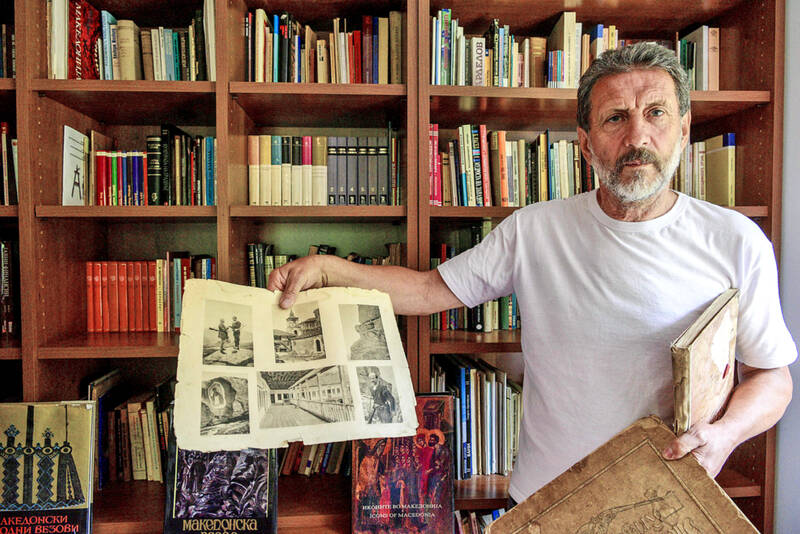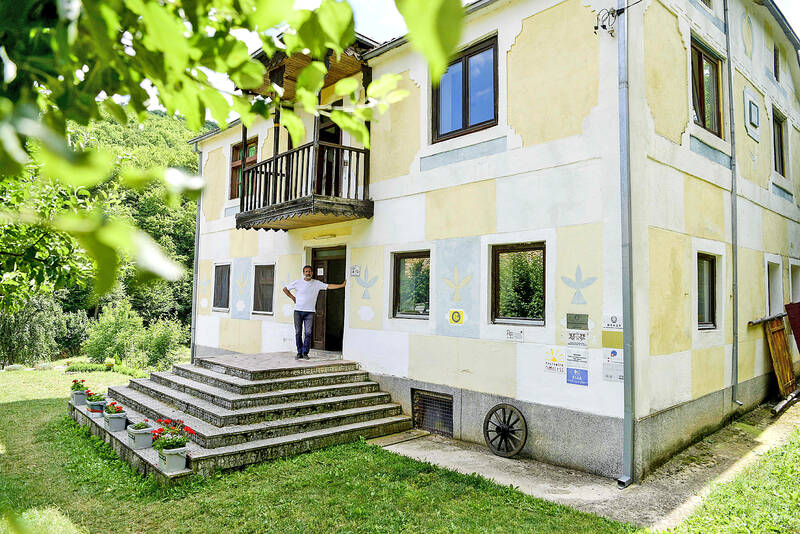Most people packed up and left the remote North Macedonian village of Babino years ago, but Stevo Stepanovski and his remarkable collection of 20,000 books stayed put in his almost abandoned valley.
The library began with Stepanovski’s great-grandfather who was given his first tranche of books by passing Ottoman soldiers in the late 19th century.
Along with history books and novels in the Macedonian language, there are tomes in Farsi, Arabic and Turkish along with a whole host of books in Serbo-Croat, the main language of the old Yugoslavia of which the village was once a part.

Photo: AFP
The library is home to original photographs by a journalist who covered World War I, antique maps and a Babel of dictionaries covering the region’s many languages.
“This is a village of enlightenment and education,” said Stepanovski, 72, who regularly welcomes guests with cups of coffee and shots of homemade fruit brandy in the centuries-old stone home where the library is housed.
The library helped make the villagers highly literate, with an inordinately large number of them becoming teachers.

Photo: AFP
“There was no house without a teacher,” Stepanovski said.
However, their learning was also the village’s undoing. In the 1950s, the Yugoslav government called up the valley’s teachers for a nationwide literacy drive — effectively robbing the area of much of its population. Like much of this impoverished corner of southeastern Europe, North Macedonia has been clobbered by a demographic slump.
The triple whammy of an aging population, sinking birthrate and mass migration has left many villages across its rural hinterland abandoned. Babino has been hit particularly hard. Once it had more than 800 inhabitants, but now there are just three permanent residents.
While Stepanovski’s adult children have moved elsewhere, he is determined to stay on with his books in Babino. Instead the world comes to him, with 3,000 to 3,500 people a year visiting the library.
Most come from nearby towns and villages or from neighboring countries, but there are also occasional travelers from Brazil, Egypt and Morocco along with a host of literary academics and researchers.
“I am surprised titles can be found here that cannot be found in city libraries,” said Goce Sekuloski, a music professor at a seminary in the capital, Skopje, who visited Babino after hearing about it from friends.
Stepanovski has also built a small amphitheater for public readings and concerts.
“We offer a peaceful mindset for people to come and sit here and experience the atmosphere,” he said. “If you want to discover the magic of books ... you can do that perfectly here.”

Packed crowds in India celebrating their cricket team’s victory ended in a deadly stampede on Wednesday, with 11 mainly young fans crushed to death, the local state’s chief minister said. Joyous cricket fans had come out to celebrate and welcome home their heroes, Royal Challengers Bengaluru, after they beat Punjab Kings in a roller-coaster Indian Premier League (IPL) cricket final on Tuesday night. However, the euphoria of the vast crowds in the southern tech city of Bengaluru ended in disaster, with Indian Prime Minister Narendra calling it “absolutely heartrending.” Karnataka Chief Minister Siddaramaiah said most of the deceased are young, with 11 dead

By 2027, Denmark would relocate its foreign convicts to a prison in Kosovo under a 200-million-euro (US$228.6 million) agreement that has raised concerns among non-governmental organizations (NGOs) and residents, but which could serve as a model for the rest of the EU. The agreement, reached in 2022 and ratified by Kosovar lawmakers last year, provides for the reception of up to 300 foreign prisoners sentenced in Denmark. They must not have been convicted of terrorism or war crimes, or have a mental condition or terminal disease. Once their sentence is completed in Kosovan, they would be deported to their home country. In

Brazil, the world’s largest Roman Catholic country, saw its Catholic population decline further in 2022, while evangelical Christians and those with no religion continued to rise, census data released on Friday by the Brazilian Institute of Geography and Statistics (IBGE) showed. The census indicated that Brazil had 100.2 million Roman Catholics in 2022, accounting for 56.7 percent of the population, down from 65.1 percent or 105.4 million recorded in the 2010 census. Meanwhile, the share of evangelical Christians rose to 26.9 percent last year, up from 21.6 percent in 2010, adding 12 million followers to reach 47.4 million — the highest figure

LOST CONTACT: The mission carried payloads from Japan, the US and Taiwan’s National Central University, including a deep space radiation probe, ispace said Japanese company ispace said its uncrewed moon lander likely crashed onto the moon’s surface during its lunar touchdown attempt yesterday, marking another failure two years after its unsuccessful inaugural mission. Tokyo-based ispace had hoped to join US firms Intuitive Machines and Firefly Aerospace as companies that have accomplished commercial landings amid a global race for the moon, which includes state-run missions from China and India. A successful mission would have made ispace the first company outside the US to achieve a moon landing. Resilience, ispace’s second lunar lander, could not decelerate fast enough as it approached the moon, and the company has